|
|
|
Sort Order |
|
|
|
Items / Page
|
|
|
|
|
|
|
| Srl | Item |
| 1 |
ID:
190779
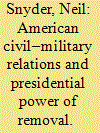

|
|
|
|
|
| Summary/Abstract |
Under what conditions are presidents more likely to remove senior defense officials from office? Using a novel data set of all senior U.S. defense officials, both civilian and uniformed military from 1947 to 2021, this article explores whether anticipated support in Congress, partisan factors, or institutional protections for the military affect observed patterns of removal for defense officials. The results suggest that presidents are more likely to remove their own appointees (or their co-partisans’ appointees), but provide little evidence that presidents premise removal on anticipated partisan support for a replacement nominee in Congress. Moreover, the results suggest that military officials may have some insulation from politicization by strong forms of removal, though that protection may weaken an important aspect of civilian control of the military, the threat of punishment by removal, raising profound questions for how civilian control endures.
|
|
|
|
|
|
|
|
|
|
|
|
|
|
|
|
| 2 |
ID:
190787
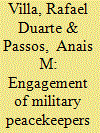

|
|
|
|
|
| Summary/Abstract |
Peacekeepers are seen as a UN tool for promoting domestic changes in host countries, but little is known about the political consequences when officers return home. During the last 10 years, Brazilian presidents appointed a significant number of former peacekeepers to key political functions. How and why do former peacekeepers end up so involved in government affairs? To answer this question, this paper focuses on the array of skills acquired by peacekeepers in domestic missions and reinforced abroad. Drawing on a set of semi-structured interviews and questionnaires to military, former political decision-makers, and researchers, as well as other primary and secondary sources, this paper details how political articulation, experience in conflict management, and prestige empowered Brazilian military officers to resume their tradition of intervention in politics. This paper also shows that peace operations can produce deleterious outcomes for troop-contributing countries in the Global South.
|
|
|
|
|
|
|
|
|
|
|
|
|
|
|
|
| 3 |
ID:
190784


|
|
|
|
|
| Summary/Abstract |
Previous research indicates that one’s identity relates to one’s use of specific coping strategies. Exploring the relationship between self and coping in military wives is crucial to understanding how they manage military lifestyle-related stressors. The researchers hypothesized that identity status, self-concept clarity, self-monitoring, mastery, and role conflict will be related to choice of emotion-focused coping or problem-focused coping strategies. Two hundred two participants completed an anonymous online survey containing standardized scales. Ordinary least squares (OLS) regression analyses revealed that emotion-focused coping had positive relationships with achieved identity status and role conflict. Problem-focused coping had positive relationships with moratorium status, self-concept clarity, self-monitoring, and mastery. Findings provide preliminary support that sense of self is important in understanding how military wives choose to cope with particular challenges.
|
|
|
|
|
|
|
|
|
|
|
|
|
|
|
|
| 4 |
ID:
190788
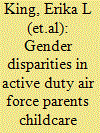

|
|
|
|
|
| Summary/Abstract |
Past reports indicate that enduring Department of Defense (DoD) childcare shortfalls may disproportionately affect women, but details regarding gender effects are unknown. This exploratory study sought to uncover the military childcare system’s pre-pandemic state by analyzing two Air Force (AF) survey datasets—the 2017 AF Community Feedback Tool and 2020 AF Childcare Survey—to examine gender gaps in active duty AF parents’ childcare access, cost and utilization, and perceptions of childcare impacts on career progression and retention. Results reveal that women—particularly those in the lowest ranks with less time on station—report more difficulties accessing childcare than male counterparts. Furthermore, fathers paid nothing for childcare and relied on spouses for childcare at higher rates, while mothers paid for care, relied on DoD childcare programs, were on DoD waitlists, reported childcare-related career impacts, and reported childcare affected their retention decisions at higher rates. Policy recommendations to improve childcare across the force are discussed.
|
|
|
|
|
|
|
|
|
|
|
|
|
|
|
|
| 5 |
ID:
190782
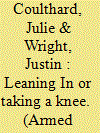

|
|
|
|
|
| Summary/Abstract |
Less research has examined the extent to which external contexts and factors that influence an organizational member’s life choices also influence their career trajectories within the military, and particularly among those who advance to leadership positions at the General Officer/Flag Officer level. Interviews were conducted with 20 select General Officer/Flag Officers in the Canadian Armed Forces. As part of a secondary analysis of an exploratory qualitative study, we applied a Life Course Theory lens to better understand the intersections between the sociohistorical and cultural context of senior leader development, and the individual choices that the participants made that led to their ascent to their rank. This study provides insight into how the historical time and place, the timing in their lives, the linked lives they share with family, and the degree of agency they maintained over their life choices led participants to “lean in” rather than “take a knee.”
|
|
|
|
|
|
|
|
|
|
|
|
|
|
|
|
| 6 |
ID:
190790


|
|
|
|
|
| Summary/Abstract |
Recently, the legal landscape for sexual minorities in the United States has changed dramatically, prompting empirical research on lesbian, gay, and bisexual (LGB) couples and LGB service members. This study examined the relationship characteristics and mental health of LGB service members in couple relationships and compared partnered and single LGB service members. A total of 238 LGB service members completed an anonymous survey, including questions about demographics, identity, military experiences, and mental health symptoms. Results of descriptive and exploratory analyses revealed no significant differences in mental health between partnered and single participants. However, partnered individuals reported higher outness and lower internalized homophobia compared with their single counterparts. Analyses also revealed negative associations between relationship satisfaction and mental health symptoms among partnered participants. Among the first to examine LGB service members’ romantic relationships, the results of this study have important clinical and policy implications and inform next steps in researching this population.
|
|
|
|
|
|
|
|
|
|
|
|
|
|
|
|
| 7 |
ID:
190783
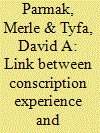

|
|
|
|
|
| Summary/Abstract |
The purpose of the study is to investigate the relationship between the experience of conscripts in their training period and their subsequent attitude toward national military service immediately after training. Self-report questionnaire is used to measure the experiences of Estonian conscripts (n = 518) in three categories: perceived stress, applied coping strategies, and evaluation of training as important. Attitude toward national military service is measured as a critical versus neutral/positive answer to an open-ended question. We found that a perceived reduction in general quality of life, concerns about what is happening at home, and experiencing/expressing negative emotions were associated with a critical attitude. In contrast, taking a proactive outlook toward training and finding military-specific aspects personally important were associated with a more neutral/positive attitude. Our findings emphasize the importance of improving the conscription training experience in order to foster less critical attitudes toward service and are discussed from a person-environment perspective.
|
|
|
|
|
|
|
|
|
|
|
|
|
|
|
|
| 8 |
ID:
190786
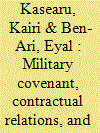

|
|
|
|
|
| Summary/Abstract |
The military covenant is a set of morally binding expectations marking the exchange between military, society, and the state. Its base is the military’s duality: like other large public institutions delivering services and its uniqueness in holding the monopoly over the use of legitimate organized state violence. The covenant is a form of relational (not transactional) contract based on trust between, and a long-term orientation of, partners; it both orders and displays these relations thereby offering both prescriptions for action and discursive means to legitimate them. The covenant can be used as an analytical (not normative) concept for theoretical development in three areas: social change and society-military ties, processual aspects of agreements between individuals and groups and the armed forces, and links between society-military ties and the social contract and social cohesion. We use the case of Estonia to illustrate the theoretical potential of the military covenant.
|
|
|
|
|
|
|
|
|
|
|
|
|
|
|
|
| 9 |
ID:
190791


|
|
|
|
|
| Summary/Abstract |
This study investigated the mental health significance of Barack Obama’s 2008 presidential election for military veterans. Many believed his election signaled a progressive shift in race relations and crucial challenge to White supremacy. Furthermore, many argued his election generated hope, especially among Blacks. We therefore hypothesized Black and Hispanic veterans would experience improved mental health after installment of the nation’s first Black commander in chief. We also hypothesized White veterans would experience no change in their mental health. With nationally representative survey data from the Behavioral Risk Factor Surveillance System (BRFSS), we tested these hypotheses by predicting poor mental health days self-identified Black, Hispanic, and White veterans experienced preelection and postelection in fall 2008. Net of established social determinants of health, we estimated Black and Hispanic veterans, respectively, experienced approximately 2.01 and 2.17 fewer poor mental health days postelection, whereas White veterans experienced no significant postelection change. Sensitivity analyses seemed to corroborate these findings.
|
|
|
|
|
|
|
|
|
|
|
|
|
|
|
|
| 10 |
ID:
190781


|
|
|
|
|
| Summary/Abstract |
More than 75 women have successfully graduated from the U.S. Army Ranger Course since the integration of women into elite military combat training. This study sought to identify the psychological characteristics and sociological variables that contributed to their motivation and success. A guided interview and demographic and psychological questionnaires were used to assess characteristics of 13 women who successfully completed elite military combat training. Collectively, these women were college graduates and had well educated fathers, possessed high levels of grit and resiliency, and described themselves as self-competitive challenge seekers. These women all had a strong male influence in their lives. The characteristics of these pioneer women may be unique from subsequent cohorts as female participation in elite military combat training becomes the norm and as attitudes and experiences change for graduates of female combat training over time.
|
|
|
|
|
|
|
|
|
|
|
|
|
|
|
|
| 11 |
ID:
190789


|
|
|
|
|
| Summary/Abstract |
Scholars argue that, historically, military women have not been considered equals to men in kinship and, therefore, have and will likely continue to experience more violence and greater fear of violence. The All-Volunteer Force (AVF) may even foster military sexual violence through sexual arenas in work-home spaces, alcohol (ab)use fueling sexual encounters between colleagues, and predatory leadership. This exploratory, grounded theory study captures insights of women veterans (n = 20) entering service between 1964 and 2016. Full inclusion is alleged, yet military women are objectified and “othered,” targets of sex-based attention, predation, and violence. From these data, military sexual violence (MSV) characterizes the AVF. To mitigate this, a renewed commitment to the US military’s historical ideal of altruistic care is necessary to realize the full inclusion of women and reduce if not eliminate military sexual violence.
|
|
|
|
|
|
|
|
|
|
|
|
|
|
|
|
| 12 |
ID:
190780
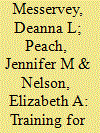

|
|
|
|
|
| Summary/Abstract |
Military ethics training has tended to focus on imparting ethical attitudes and on improving deliberative moral decision-making through classroom instruction. However, military personnel can be exposed to extreme conditions on operations, which can lead to heat-of-the-moment thinking. Under stress, individuals are more likely to engage in automatic processing than deliberative processing, and visceral states such as anger and disgust can increase a person’s risk of behaving unethically. We propose that military ethics training could be improved by reinforcing classroom ethics training with interventions to counteract these risk factors. As training interventions, we recommend incorporating affect-labeling, goal-setting, and perspective-taking into realistic, pre-deployment training to make moral decision-making more robust against stress and other emotional experiences typical in combat. We outline steps researchers and trainers can take to test whether these interventions have the desired impact on ethical behavior.
|
|
|
|
|
|
|
|
|
|
|
|
|
|
|
|
| 13 |
ID:
190785
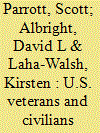

|
|
|
|
|
| Summary/Abstract |
The news media often portray military veterans in stereotypical ways, providing audiences narrow representations in which veterans are traumatized heroes. What happens when a veteran sees these storylines and assumes they affect how the public thinks about veterans? This question informs this study, which used a two-prong approach (online, telephone) to survey 1,047 American adults about news media and veterans. Respondents, including veterans and civilians, were asked to recall news stories about veterans, assess the quality of news coverage of veterans, and offer opinions concerning whether news coverage affects themselves and other people. When respondents could recall a news story about veterans, they described stereotypical stories related to victimization/harm, heroism, charity/social support, mental illness, and violence. Respondents, both civilian and veteran, described news coverage as mediocre and felt the news affects other people more than themselves.
|
|
|
|
|
|
|
|
|
|
|
|
|
|
|
|
| 14 |
ID:
190792


|
|
|
|
|
| Summary/Abstract |
As a reaction to the Veterans Affairs (VA) hospital scandal in 2014, the Veterans Choice Act of 2014 was enacted to enhance veterans’ access to health care. This study evaluated the productivity change of a panel of 102 VA hospitals from 2011 through 2019 to examine how the Act influenced the overall VA hospital productivity. The results revealed that the overall productivity of VA hospitals declined over the period and VA hospitals were not operating at an optimal scale to produce maximum outputs due to a decrease in the number of veteran patients after the Act was implemented. In addition, the technical change value less than 1 implies that VA hospitals produced fewer outputs with the given input resources over the period due to lagged adoption of innovative health care technology.
|
|
|
|
|
|
|
|
|
|
|
|
|
|
|
|
|
|
|
|
|